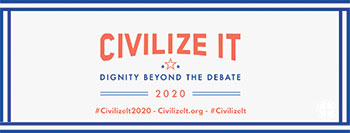Week 7: Pray, Learn, Act as Faithful Citizens
 The archdiocesan Office of Human Life and Dignity and Catholic Charities-Social Concerns, with the approval of the Indiana Catholic Conference, have collaborated to offer the final of seven articles on prayer, study and action as we prepare for upcoming elections.
The archdiocesan Office of Human Life and Dignity and Catholic Charities-Social Concerns, with the approval of the Indiana Catholic Conference, have collaborated to offer the final of seven articles on prayer, study and action as we prepare for upcoming elections.
This week, we will spend intentional time in prayer, discerning our vote.
To view the previous articles in English and Spanish, go to cutt.ly/ArchIndyCivilizeIt.
Pray
Prayer Before an Election:
Lord God, as the election approaches, we seek to better understand the issues and concerns that confront our city, state and country, and how the Gospel compels us to respond as faithful citizens in our community.
We ask for eyes that are free from blindness so that we might see each other as brothers and sisters, one and equal in dignity, especially those who are victims of abuse and violence, deceit and poverty.
We ask for ears that will hear the cries of children unborn and those abandoned, men and women oppressed because of race or creed, religion or gender.
We ask for minds and hearts that are open to hearing the voice of leaders who will bring us closer to your kingdom.
We pray for discernment so that we may choose leaders who hear your word, live your love, and keep in the ways of your truth as they follow in the steps of Jesus and his Apostles and guide us to your kingdom of justice and peace.
We ask this in the name of your Son Jesus Christ and through the power of the Holy Spirit.
Amen.
(This prayer from the USCCB is available at cutt.ly/USCCBElectionPrayer.)
Learn
What does it mean to form my conscience?
Catholics have a long tradition of engagement in the public square. Sometimes that engagement requires making difficult moral decisions that impact our own lives and those of others. Our conscience can help guide the decisions we make. The Second Vatican Council guides us: “Always summoning [one] to love good and avoid evil, the voice of conscience can when necessary speak to [one’s] heart more specifically: do this, shun that” (“Gaudium et Spes,” #16). However, our conscience doesn’t just come to us when we are born. We must work throughout our lives to form it through prayer, learning and conversation.
How do I form my conscience?
It takes time to form our consciences so that we can make well-reasoned judgments about particular, real-life situations. The Church teaches that it is important to work continually on conscience formation so we can be prepared to make decisions whenever the opportunity arises. Some specific ideas to form your conscience are:
-
Begin by being open to the truth and what is right.
-
Study sacred Scripture and the teachings of the Church.
-
Examine the facts and background information about various choices and be discerning in where you gather information.
-
Prayerfully reflect to discern the will of God (“Forming Consciences for Faithful Citizenship,” #18).
Additionally, it is important to remember our community of faith can help us form good consciences through some of these steps:
-
Seek the prudent advice and good example of trusted leaders and others to support and enlighten your conscience.
-
Learn about the authoritative teaching of the Church.
-
Pray for the gifts of the Holy Spirit to help develop your conscience.
-
Regularly do an examination of conscience to hear God’s voice in your life.
Doing the work of forming our consciences can seem daunting. Fortunately, we have many Church teachings that can help us in this important task. “Forming Consciences for Faithful Citizenship” is an important resource for U.S. Catholics. It helps in prayerful reflection on how to apply Church teachings in our civic life. “Conscience is not something that allows us to justify doing whatever we want, nor is it a mere ‘feeling’ about what we should or should not do. Rather, conscience is the voice of God resounding in the human heart, revealing the truth to us and calling us to do what is good while shunning what is evil” (“Forming Consciences for Faithful Citizenship,” #17).
Here are some questions for further reflection:
-
When has my conscience guided me to “do good and avoid evil?”
-
What are some key resources I can use to form my conscience?
-
Forming conscience is a lifelong task. What do I do to regularly form my conscience? What more should I do?
Act
You’ve completed seven weeks of prayer, study and action to prepare for this election. Make a plan to vote on or before election day on Nov. 3. May the peace of Christ be with you. †
